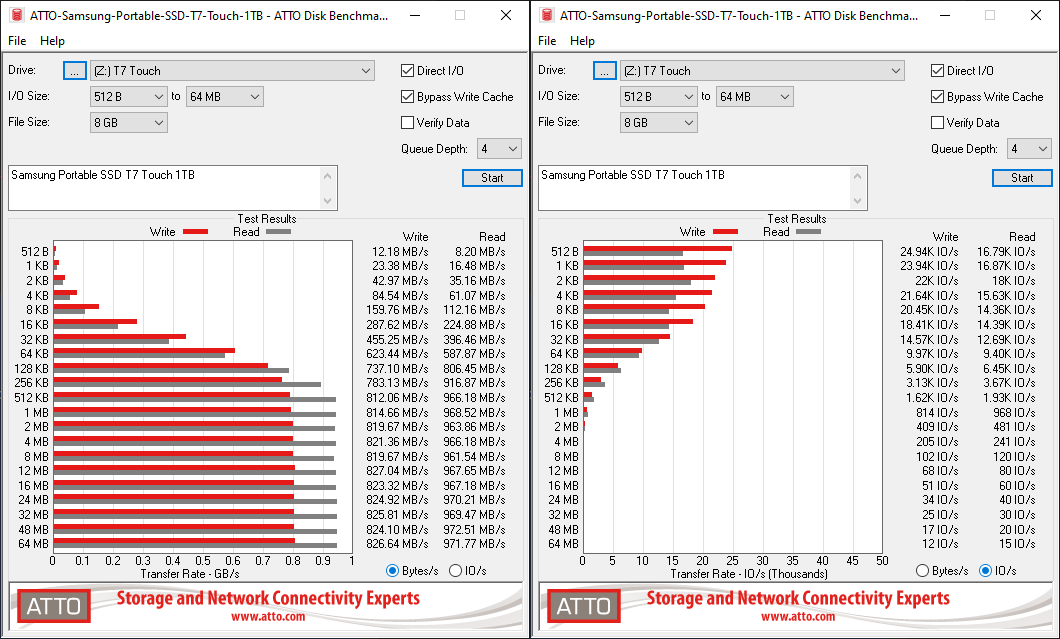USB 3.2 Gen 2 Portable SSDs Roundup - Featuring the Samsung T7 Touch and the SanDisk Extreme Pro
by Ganesh T S on January 23, 2020 9:00 AM ESTSynthetic Benchmarks - ATTO and CrystalDiskMark
Most USB 3.2 Gen 2 NVMe-based SSDs claim read speeds of up to 1050 MBps and write speeds of up to 1000 MBps. Most of these claims are backed up by the ATTO benchmarks provided below. Unfortunately, these access traces are not very common in real-life scenarios.
| Drive Performance Benchmarks - ATTO |
 |
The 2TB OWC Envoy Pro EX USB-C tops the write charts at close to 935 MBps, with the rest clustered between 850 MBps and 900 MBps. On the read side, the drives are clustered around 970 MBps to 980 MBps.
CrystalDiskMark, despite being a canned benchmark, provides a better estimate of the performance range with a selected set of numbers. As evident from the screenshot below, the performance can dip to as low as 20 - 40 MBps for small-sized reads at very low queue depths.
| Drive Performance Benchmarks - CrystalDiskMark |
 |
Read speeds saturate around 1020 MBps for most drives, and writes around 900 MBps. The T7 Touch appears to lag behind the rest a bit in all the workloads, while remaining in the same ballpark.










38 Comments
View All Comments
lilkwarrior - Thursday, January 23, 2020 - link
Seems pointless to not be Thunderbolt 3 or USB4.avbohemen - Thursday, January 23, 2020 - link
I wonder what the limit is in the atto/as-ssd iops test. All drives hit a limit of 23-25k 4kB iops (atto) or 32k 4kB iops (as-ssd).Throughput is not saturated with 4kB iops and the drives are different enough in other benchmarks.
Is it a limitation of the usb/uasp protocol or the bridge chip, or something else?
avbohemen - Thursday, January 23, 2020 - link
Sorry, I mean crystaldiskmark instead of as-ssd.Soulkeeper - Thursday, January 23, 2020 - link
The crucial looked like the winner untill I saw the Performance Consistency results. Horrible.Otherwise most the benchmark results, outside of this, seem very close for all the drives to me.
ganeshts - Friday, January 24, 2020 - link
Exactly! And, dare I say, for most casual users, the Crucial drive actual works out well. It is only power users and tech-savvy folks who expect to 'torture' their external drives that need to watch out :) Unlike other review sites [ and I don't want to name any ;) ], our aim is to give the complete picture so that readers can make an informed purchase decision.To be honest, if I were to purchase a portable SSD for occasional periodic backups (say, 10 - 20 GB of data at a time), the X8 is actually a good candidate because of the pricing alone.
dcroteau - Thursday, January 23, 2020 - link
What kind of fake data is that?An NVMe drive at 19 degree Celsius? Less than room temperature?
They run notoriously hot and wouldn't be below 30C in any circumstances. They can go as high as 70C without a proper heat sink.
Even with proper cooling, they will never be below room temp. 19C is very frisky for a room temperature.
ganeshts - Friday, January 24, 2020 - link
It is winter here in CA and the room temperature in my lab is around 63F (as I rarely turn on the air-conditioning in the lab for winters - the benchmarking testbeds are operated remotely / headless).Meteor2 - Saturday, January 25, 2020 - link
My heating never goes above 19C. Put a jumper on and save the planet.regsEx - Thursday, January 23, 2020 - link
USB 3.2 Gen 2 is just rebranded USB 3.1. Actual USB 3.2 is Gen 2x2.Tomatotech - Friday, January 24, 2020 - link
I hope you understood that as I didn’t at all.